|
|
|
Sort Order |
|
|
|
Items / Page
|
|
|
|
|
|
|
| Srl | Item |
| 1 |
ID:
108665
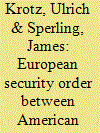

|
|
|
|
|
| Publication |
2011.
|
| Summary/Abstract |
We investigate the impact of historically rooted domestic constructions of purpose and ambition on the patterns of discord and collaboration in the Franco-American relationship over the course of the postwar and post-cold war periods. We stress the importance and tenacity of domestic historical constructions for explaining and understanding the foreign policy strategies that would otherwise confound a power-based analysis. The Franco-American bilateral relationship, in particular, illustrates the persistence and tenacity of each nation's historically constructed foreign policy conception during the bipolar distribution of power during the cold war and the contested unipolarity of the post-cold war era. We conclude with an assessment of the salience and relevance of domestic elements of foreign policy role and purpose for explaining and understanding how their bilateral relationship has affected the European security order into the second decade of the twenty-first century.
|
|
|
|
|
|
|
|
|
|
|
|
|
|
|
|
| 2 |
ID:
079485
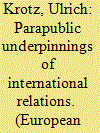

|
|
|
|
|
| Publication |
2007.
|
| Summary/Abstract |
Parapublic underpinnings of international relations are cross-border interactions that belong neither to the public world of states nor to the private world of societies. They underpin relations among specific states and construct social purpose in the international realm. Focusing on Franco-German parapublic underpinnings reveals a particular and neglected kind of `Europeanization'. Such parapublic activity includes massive state-financed youth exchanges, some two thousand municipal partnerships, and a host of institutes and associations. In their entirety, these parapublic interactions have developed into structural components of the European polity. Rather than directly affecting domestic political affairs, this kind of Europeanization connects French and Germans in a certain way. It makes Europeans more European, but without making them less national. This article contributes a concept to properly capture a distinct and substantial type of international activity and to identify its characteristic effects and limitations
|
|
|
|
|
|
|
|
|
|
|
|
|
|
|
|
| 3 |
ID:
095599
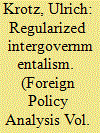

|
|
|
|
|
| Publication |
2010.
|
| Summary/Abstract |
Regularized intergovernmentalism refers to a distinct kind of foreign policy practice that connects and intertwines foreign policy processes in particular ways. This paper puts forth a concept to properly capture and expose such distinctive foreign policy realities characterizing certain periods and places. With this concept, the article systematically scrutinizes the intergovernmental fabric of bilateral Franco-German relations from 1963 to 2009. The characteristic features of Franco-German regularized intergovernmentalism represent a crucial foreign policy connection, foundational for European affairs of the past half century and a defining feature of Europe's post-war order and regional governance. Exploring key aspects of what it is that links France and Germany in particular ways, this paper offers a historically deeply grounded constitutive analysis. Based on its constitutive inquiries, the papers points at new possibilities of causal theorizing and explores some of regularized intergovernmentalism's hypothesized effects and limitations. Franco-German intergovernmental affairs may be the most developed instance of this practice. But regularized bilateral intergovernmentalism is not a Franco-German idiosyncrasy. Rather, it is an important and apparently growing approach to structuring foreign policy conduct, and seems an increasingly prominent aspect of how the world is organized.
|
|
|
|
|
|
|
|
|
|
|
|
|
|
|
|
| 4 |
ID:
103903
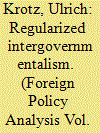

|
|
|
|
|
| Publication |
2010.
|
| Summary/Abstract |
Regularized intergovernmentalism refers to a distinct kind of foreign policy practice that connects and intertwines foreign policy processes in particular ways. This paper puts forth a concept to properly capture and expose such distinctive foreign policy realities characterizing certain periods and places. With this concept, the article systematically scrutinizes the intergovernmental fabric of bilateral Franco-German relations from 1963 to 2009. The characteristic features of Franco-German regularized intergovernmentalism represent a crucial foreign policy connection, foundational for European affairs of the past half century and a defining feature of Europe's post-war order and regional governance. Exploring key aspects of what it is that links France and Germany in particular ways, this paper offers a historically deeply grounded constitutive analysis. Based on its constitutive inquiries, the papers points at new possibilities of causal theorizing and explores some of regularized intergovernmentalism's hypothesized effects and limitations. Franco-German intergovernmental affairs may be the most developed instance of this practice. But regularized bilateral intergovernmentalism is not a Franco-German idiosyncrasy. Rather, it is an important and apparently growing approach to structuring foreign policy conduct, and seems an increasingly prominent aspect of how the world is organized.
|
|
|
|
|
|
|
|
|
|
|
|
|
|
|
|
| 5 |
ID:
131428
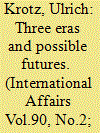

|
|
|
|
|
| Publication |
2014.
|
| Summary/Abstract |
This article offers a long-term perspective on the relations between France and Germany a century after the First World War. It probes three grand periods in Franco-German affairs: 'hereditary enmity' (1871-1945), 'reconciliation' (1945-63) and the 'special relationship' since 1963. Through an investigation of the basic meaning and patterns of interstate interaction, particularly the resilient and adaptable embedded bilateralism of recent decades, the article seeks not only to delineate the key elements of the past, but also to accentuate the stakes of the present, as well as to cast an eye towards the future. The significance of the current crises in European affairs, this article maintains, lies not in the first place in their momentary tumult or troubles, but rather in their potential to unravel constitutive aspects of Franco-German relations and European politics of the past half century. Today, next to a rejuvenated Franco-German bilateralism embedded in a wider Europe, two other trajectories appear as 'possible futures': German hegemony in a partially integrated Europe; and a Europe of chronic muddling through, presumably along with a degeneration of the European project.
|
|
|
|
|
|
|
|
|
|
|
|
|
|
|
|
|
|
|
|
|